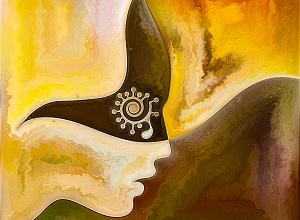Nearly one in five people is diagnosed with a psychiatric condition within three months of contracting coronavirus – double the usual rate from other illnesses, according to a large study published The Lancet Psychiatry. One in four of those diagnosed had never had a psychiatric diagnosis before their COVID-19 infection.
People over 65 were also at double the risk of being diagnosed with dementia, although researchers said the condition may have gone unnoticed until they were hospitalised with the virus.
Unexpectedly, they also found existing psychiatric patients were 65% more likely to be diagnosed with COVID-19. This could be linked to their physical health or drugs prescribed to treat disorders, the researchers speculated.The team believes the link is strong enough that poor mental health should now be seen as a risk factor for coronavirus.
The study was observational and researchers are unsure whether the effect is being caused by the biological effect of coronavirus or underlying anxieties linked to the pandemic.
The Oxford University-led study used the health records of almost 70m people in the US, which included more than 62,000 cases of COVID-19, who were tracked for three months after diagnosis and compared them with thousands of people with other conditions, such as flu, kidney stones and broken bones.
The proportions diagnosed with a psychiatric illness were:
18% of those with Covid
13% of those with flu
12.7% of those with a fracture
Excluding those who had previously been diagnosed with a disorder and relapsed, they were:
5.8% of those with Covid
2.8% of those with flu
2.5% of those with a fracture
The most common diagnosis was anxiety, which included adjustment disorder, generalised anxiety disorder, and post-traumatic stress disorder. Mood disorders were slightly less common.
Paul Harrison, professor of psychiatry at the University of Oxford, who led the study, said: "People have been worried that Covid-19 survivors will be at greater risk of mental health problems, and our findings in a large and detailed study show this to be likely. Commonest were anxiety diagnoses followed by depressive disorders and insomnia."
Abstract
Background
Adverse mental health consequences of COVID-19, including anxiety and depression, have been widely predicted but not yet accurately measured. There are a range of physical health risk factors for COVID-19, but it is not known if there are also psychiatric risk factors. In this electronic health record network cohort study using data from 69 million individuals, 62 354 of whom had a diagnosis of COVID-19, we assessed whether a diagnosis of COVID-19 (compared with other health events) was associated with increased rates of subsequent psychiatric diagnoses, and whether patients with a history of psychiatric illness are at a higher risk of being diagnosed with COVID-19.
Methods
We used the TriNetX Analytics Network, a global federated network that captures anonymised data from electronic health records in 54 health-care organisations in the USA, totalling 69·8 million patients. TriNetX included 62 354 patients diagnosed with COVID-19 between Jan 20, and Aug 1, 2020. We created cohorts of patients who had been diagnosed with COVID-19 or a range of other health events. We used propensity score matching to control for confounding by risk factors for COVID-19 and for severity of illness. We measured the incidence of and hazard ratios (HRs) for psychiatric disorders, dementia, and insomnia, during the first 14 to 90 days after a diagnosis of COVID-19.
Findings
In patients with no previous psychiatric history, a diagnosis of COVID-19 was associated with increased incidence of a first psychiatric diagnosis in the following 14 to 90 days compared with six other health events (HR 2·1, 95% CI 1·8–2·5 vs influenza; 1·7, 1·5–1·9 vs other respiratory tract infections; 1·6, 1·4–1·9 vs skin infection; 1·6, 1·3–1·9 vs cholelithiasis; 2·2, 1·9–2·6 vs urolithiasis, and 2·1, 1·9–2·5 vs fracture of a large bone; all p<0·0001). The HR was greatest for anxiety disorders, insomnia, and dementia. We observed similar findings, although with smaller HRs, when relapses and new diagnoses were measured. The incidence of any psychiatric diagnosis in the 14 to 90 days after COVID-19 diagnosis was 18·1% (95% CI 17·6–18·6), including 5·8% (5·2–6·4) that were a first diagnosis. The incidence of a first diagnosis of dementia in the 14 to 90 days after COVID-19 diagnosis was 1·6% (95% CI 1·2–2·1) in people older than 65 years. A psychiatric diagnosis in the previous year was associated with a higher incidence of COVID-19 diagnosis (relative risk 1·65, 95% CI 1·59–1·71; p<0·0001). This risk was independent of known physical health risk factors for COVID-19, but we cannot exclude possible residual confounding by socioeconomic factors. Interpretation Survivors of COVID-19 appear to be at increased risk of psychiatric sequelae, and a psychiatric diagnosis might be an independent risk factor for COVID-19. Although preliminary, our findings have implications for clinical services, and prospective cohort studies are warranted.
[link url="https://www.thelancet.com/journals/lanpsy/article/PIIS2215-0366(20)30462-4/fulltext"]Full study in The Lancet Psychiatry (Open Access)[/link]

